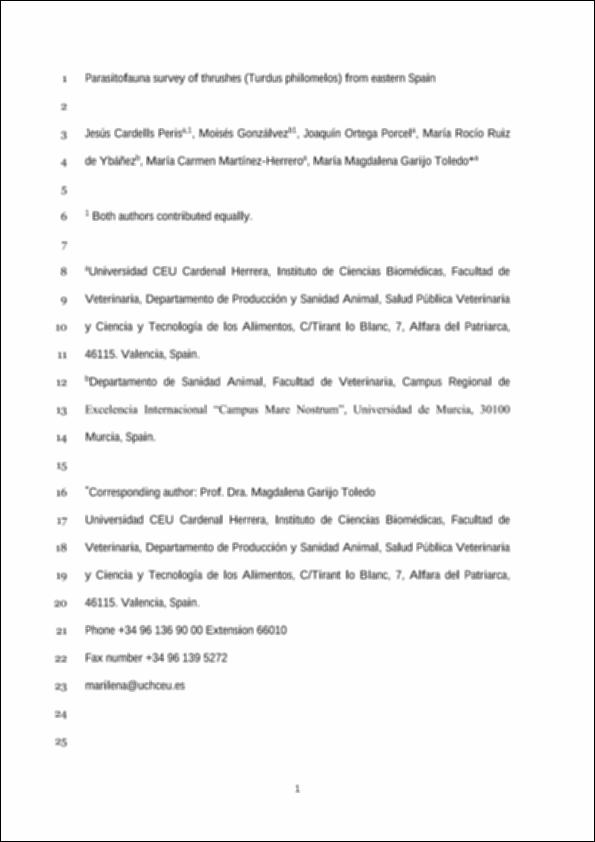Por favor, use este identificador para citar o enlazar este ítem:
http://hdl.handle.net/10637/11725Parasitofauna survey of "Song thrushes" (Turdus philomelos) from the eastern part of Spain
| Título : | Parasitofauna survey of "Song thrushes" (Turdus philomelos) from the eastern part of Spain |
| Otros títulos: | Parasitofauna survey of "thrushes" (Turdus philomelos) from eastern Spain |
| Autor : | Cardells Peris, Jesús Gonzálvez Juan, Moisés Ortega Porcel, Joaquín Ruiz de Ybáñez, María Rocío Martínez Herrero, María del Carmen Garijo Toledo, María Magdalena |
| Materias: | Aves - Enfermeades - España - Comunidad Valenciana.; Birds - Diseases - Spain - Valencia (Autonomous Community); Veterinary epidemiology - Spain - Valencia (Autonomous Community); Zorzal común - Parásitos - España - Comunidad Valenciana.; Epizootiología - España - Comunidad Valenciana.; Song thrush - Parasites - Spain - Valencia (Autonomous Community) |
| Editorial : | Elsevier. |
| Citación : | Cardells-Peris, J., Gonzálvez, M., Ortega-Porcel, J., Ruiz de Ybáñez, M.R., Martínez-Herrero, M.C. & Garijo-Toledo, M.M. (2020). Parasitofauna survey of "Song thrushes" (Turdus philomelos) from the eastern part of Spain. Parasitology International, vol. 79 (dec.), art. 102176. DOI: https://doi.org/10.1016/j.parint.2020.102176 |
| Resumen : | Thrushes (Turdus spp.) are migratory passerine birds found in northern Europe during the summer months and in southern Europe and north of Africa during the winter. They constitute an important small game bird group very appreciated by Spanish hunters. Between October 2013 and February 2014, 90 thrushes were collected and submitted to the Veterinary Faculty of the University CEU-Cardenal Herrera (Valencia, Spain). After necropsies, three species of helminths were macroscopically recovered from 15 animals (16.7%): Morishitium polonicum (16.7%), Splendidofilaria spp. (6.7%) and Raillietina spp. (7.8%). Moreover, twelve of the positive thrushes (80%) harboured microfilaria in pulmonary blood vessels and three of them (20%) were infected by Sarcocystis spp. on skeletal musculature. All parasitised birds showed lesions, ranging from mild to moderate tracheitis, aerosaculitis, enteritis and hepatitis, being the first report of severe enteric and hepatic lesions associated to M. polonicum infection in Turdidae. Furthermore, this is the first description of Raillietina spp. and Sarcocystis spp. in thrushes from Spain. The results obtained in this survey reveal the need for further studies to evaluate the epidemiological role of thrushes as spreaders of several parasites during their annual migration. |
| Descripción : | Este artículo se encuentra disponible en la página web de la revista en la siguiente URL: https://www.sciencedirect.com/science/article/abs/pii/S1383576920301264 This is the pre-peer reviewed version of the following article: Cardells-Peris, J., Gonzálvez, M., Ortega-Porcel, J., Ruiz de Ybáñez,MR., Martínez-Herrero, MC. & Garijo-Toledo, MM. (2020). Parasitofauna survey of song thrushes (Turdus philomelos) from the eastern part of Spain. Parasitology International, vol. 79, art. 102176, which has been published in final form at https://doi.org/10.1016/j.parint.2020.102176. Este es el pre-print del siguiente artículo: Cardells-Peris, J., Gonzálvez, M., Ortega-Porcel, J., Ruiz de Ybáñez,MR., Martínez-Herrero, MC. & Garijo-Toledo, MM. (2020). Parasitofauna survey of song thrushes (Turdus philomelos) from the eastern part of Spain. Parasitology International, vol. 79, art. 102176, que se ha publicado de forma definitiva en https://doi.org/10.1016/j.parint.2020.102176. |
| URI : | http://hdl.handle.net/10637/11725 |
| Derechos: | http://creativecommons.org/licenses/by-nc-nd/4.0/deed.es |
| ISSN : | 1383-5769. |
| Fecha de publicación : | 1-dic-2020 |
| Centro : | Universidad Cardenal Herrera-CEU |
| Aparece en las colecciones: | Dpto. Producción y Sanidad Animal, Salud Pública Veterinaria y Ciencia y Tecnología de los Alimentos |
Los ítems de DSpace están protegidos por copyright, con todos los derechos reservados, a menos que se indique lo contrario.


